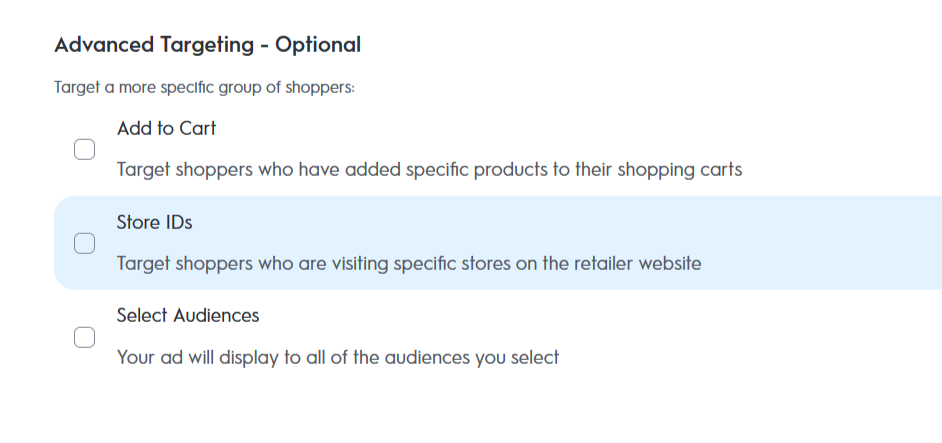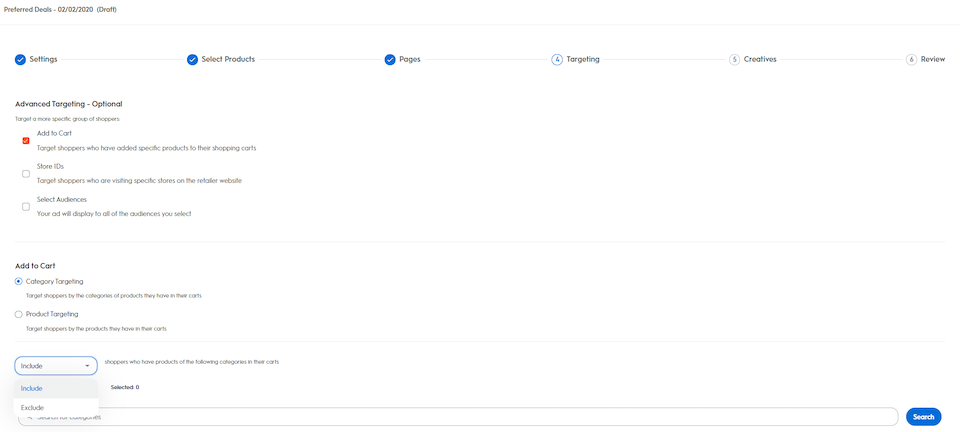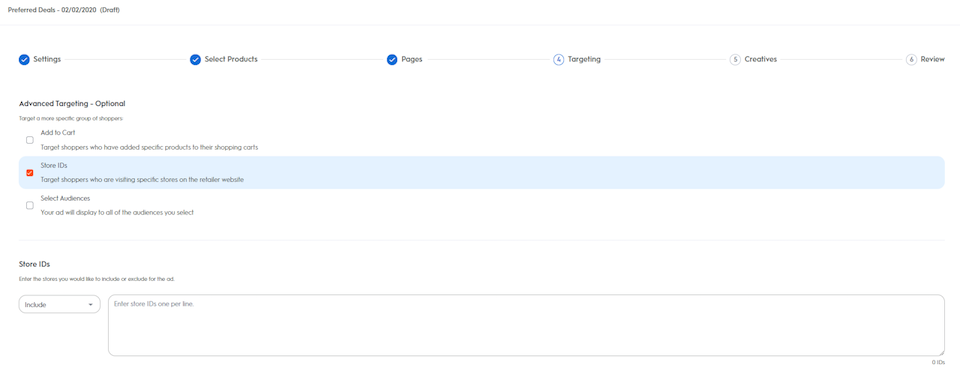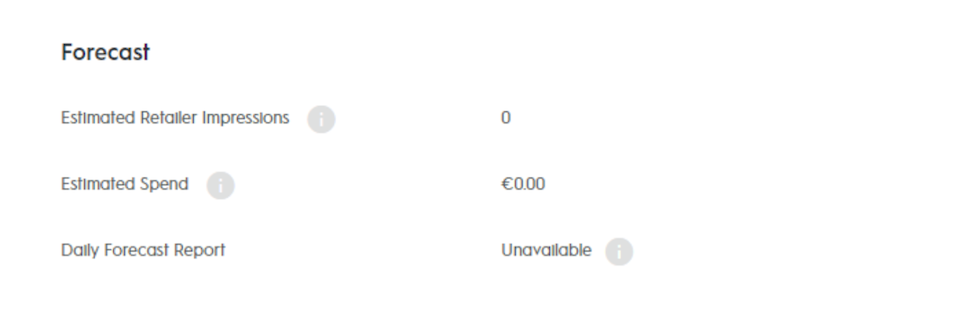




Targeting Options
You have the option to select an advanced targeting rule to focus your line item's delivery to a specific group of shoppers. You may proceed with creating the line item without selecting any advanced targeting. In that case, your ad will use contextual targeting based on the page type and categories or keywords you set up in the previous step of your line item creation. Note that targeting may increase the CPM.
The advanced targeting options are the following:
Real-time data targeting:
Add to Cart
Category targeting
Product targeting
Store ID
Shopping history targeting:
Audience
If one of the targeting options above is not listed, it means that it is not available for your selected page type and retailer combination.

Real-time Targeting: Add to Cart
With the Add to Cart targeting option, you can target shoppers who have specific products or categories of products in their shopping carts.
The following Add to Cart targeting options are supported: Category targeting and Product targeting.
Category Targeting
Target shoppers by the categories of products they have in their carts. You can either include or exclude shoppers.
Enter the name of the category you want to target in the search bar. Categories that match the query will be returned in the search results.
To select a category, mark the checkbox on the right side of the Search Results. To deselect a category, clear the checkbox or navigate to the Selected tab and clear the checkbox.
Review the categories you have selected by navigating to the Selected tab. The Selected tab also displays the number of categories selected.
Product Targeting
Target shoppers by the specific product(s) they have in their carts. You can either include or exclude shoppers.
You can use the following methods to search for products:
Enter Product ID
Select the Product ID Type using the dropdown. The following types are supported: GTIN, UPC, or EAN; MPN; Model Number; SKU ID; SKU Key; Parent ID.
Make sure that you enter one ID per row and then click the Add button.
All products that match your query will be selected. Review the selection by navigating to the Products Selected tab. The tab also displays the number of products selected.
Products that cannot be matched using the ID queried will be listed in a separate textbox. If an ID is unmatched, we recommend using another Product ID Type and search again.
If you're having trouble finding a product, please reach out to your Criteo Team.
Search by keyword
Enter the name of the product in the search bar and click the Search button.
Products that match the search query will be returned in the Search Results table. Within the Search Results table:
To select a product, mark the checkbox on the right side.
To deselect a product, clear the checkbox on the right side.
If the product cannot be found, we recommend searching again with a different query. Otherwise, you can reach out to your Criteo Team for further assistance.
Review the products you have selected by navigating to the Products Selected tab. The Products Selected tab also displays the number of products selected.

Store and Audience Targeting
Store ID Targeting
Target shoppers who are currently visiting specific store locations on the retailer's website or app. By default, all stores are included.
You can either include or exclude store locations from your ad delivery.
Make sure that you enter one ID per line.
Audience Targeting
Target shoppers based on their shopping behavior history by choosing audience segments. Select one or multiple audiences in the table. Your ad will be shown to shoppers of any of the audiences selected.
Search for the audience segment you want to target. The table can be sorted alphabetically by clicking on the Audience header. The table can also be sorted by username by clicking on the Created by header.
By default, the table returns the first 25 audience segments that match the search query. To see more results, either increase the number of items per page via the dropdown on the button in the right corner or navigate to the next page using the arrow on the bottom right side.
To create an audience segment, navigate to the Audiences tab on the Platform menu. For more information, see the Library: Audience and Creative article.

Forecasting Impressions
The forecast provides estimates of the retailer impressions and spend you might expect if you spend 100% of your line item budget. It is calculated using the traffic of previous months and years to anticipate the effects of the seasonality and growth rates.
Estimated Retailer Impressions: The estimated number of retailer impressions you can gain from the estimated spend. This estimate does not take into account competitors who target the same inventory.
Estimated Spend: The estimated spend needed to gain the estimated retailer impressions. You can use this amount, the budget, and your business knowledge to estimate the amount you’ll need to spend.
The forecast considers the following data:
Targeted page type
Targeted taxonomies and keywords
Start and end dates
Provided formats
The forecast does not yet consider the following data:
Competition—we are not yet able to view the inventory other advertisers have booked
User-centric delivery data, such as frequency capping and targeted segments/audiences
The age of the forecasting data depends on the implementation date of the Criteo OneTag. If the retailer was already connected to RSX, then the age of the data is preserved.
